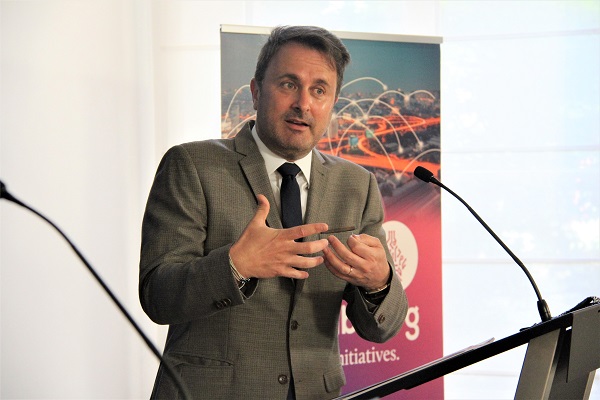 PM Xavier Bettel;
Credit: ME
PM Xavier Bettel;
Credit: ME
On Wednesday 28 April 2021, Luxembourg's Prime Minister Xavier Bettel, in his dual capacity as Minister for Communications and Media and Minister for Digitalisation, presented the results of the public consultation on artificial intelligence (AI).
Presented in May 2019, the Luxembourg government's strategic vision for AI defines an approach centred on human needs: a technology that must gradually take root in the social fabric, improve the lives of all and consolidate Luxembourg's activities as a nation and as a member of the international community. In order to implement this approach, the Prime Minister decided to launch a public consultation on the perception of AI among the population.
To this end, the media and communications service of the Ministry of State, the Ministry of Digitalisation and the Luxembourg Institute of Socio-Economic Research (LISER) drew up a questionnaire intended for the resident population with a view to better understand public opinion on AI.
Prime Minister Xavier Bettel noted: "AI is indeed seen by our citizens as a solution in their daily lives and I am delighted that we have been able to create more clarity with this consultation to guide our policy". The consultation was carried out through a web survey with a questionnaire available in Luxembourgish, French and German. The Government IT Centre selected a sample of around 20,000 people, aged 16 and over, to whom a letter was sent to participate voluntarily in the questionnaire. The period for collecting responses was one month.
Main results
In terms of advantages, a large majority of residents aged 16 and over considered that AI could facilitate the tasks of daily life (70%) and that it made it possible to automate repetitive professional tasks (64%). Just under one in four individuals (22%) said they were not sufficiently informed about AI to express an opinion on this question.
Regarding the perceived risks, 70% of participants believed that AI could act in a discriminatory manner or be biased. Likewise, 64% considered AI to be unreliable and 56% believed AI was unable to distinguish between good and bad consequences.
Concerning trust in AI, 77% of those in public administration had a high or medium level of trust, compared to 46% in the private sector. Public administration was the field in which the proportion of individuals in favour of an increased use of AI was highest, particularly with regard to reducing administrative procedures. This proportion was also high in the mobility sector, particularly regarding an intelligent traffic system, and the health sector, in particular with regard to receiving accurate medical diagnoses and preventing disease.
In addition, more than 80% of individuals expressed the wish for an awareness and information campaign to be set up on the use of AI.
Current projects and next steps
In light of these results, Prime Minister Xavier Bettel emphasised the need for administration to promote the highest standards of ethics, security and transparency. He noted: “We cannot hide behind the complexity of the technology and will have to stay in constant exchange with the experts. We must actively ensure to avoid any inequalities linked to AI and to ensure that the human being is always the beneficiary of the technology”. In fact, more than 80% of respondents confirmed the need for a data ethics committee - a project that will be analysed by the administration in the coming months.
The Prime Minister also presented various training offers in the field of AI, both for the general public and for members of the public service. He highlighted the first edition of the Luxembourg version of the “Elements of AI” course, made available by the University of Luxembourg Competence Centre and the INAP (national institute of public administration), which recently concluded with great success in terms of participation. In addition, the online course “Behind an accurate prediction: machine learning in an industrial environment”, set up by the Competence Centre with the support of the Luxembourg government, will launch on 3 May 2021.
Finally, Prime Minister Xavier Bettel presented the progress of the AI4GOV call for projects, which is now in its second edition. A dozen projects within different administrations are being developed in order to experiment concretely with the most modern algorithms.








